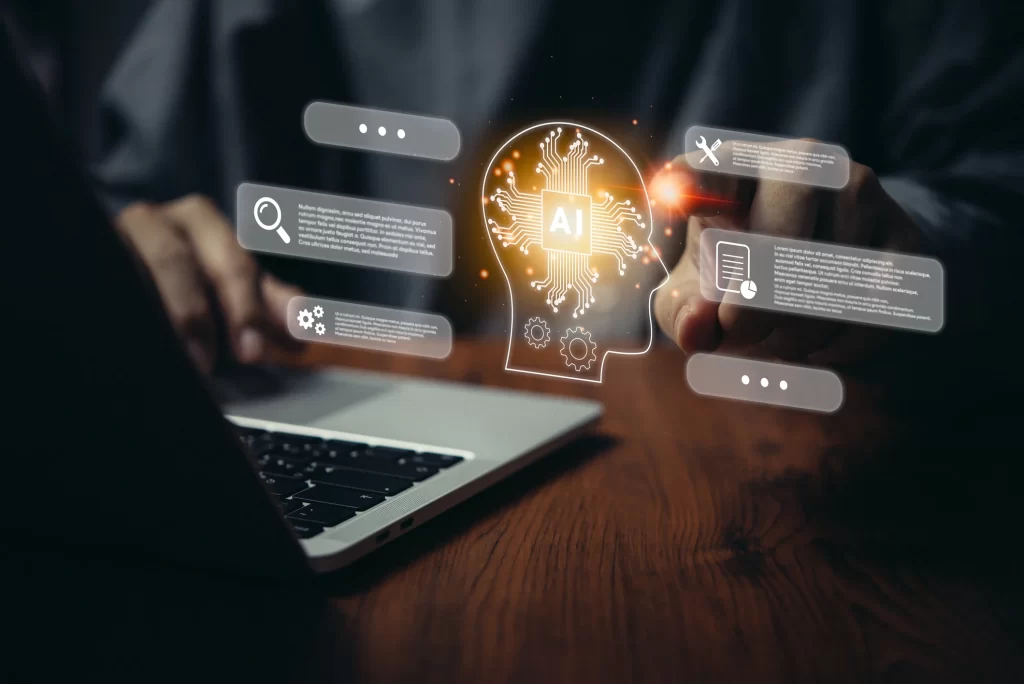
Artificial Intelligence (AI) has become integral to modern social media platforms, transforming how content is created, shared, and consumed. From enhancing user experiences to optimizing marketing strategies, AI’s impact on social media is profound and multifaceted. This blog explores how AI is revolutionizing social media platforms, the benefits and challenges it brings, and the future trends we can expect in this rapidly evolving landscape.
Introduction to AI in Social Media
AI refers to the simulation of human intelligence in machines designed to think and act like humans. These intelligent systems can learn from data, recognize patterns, and make decisions with minimal human intervention. In the context of social media, AI encompasses a wide range of technologies, including machine learning, natural language processing (NLP), and computer vision.
The Integration of AI in Social Media
Social media platforms leverage AI to process and analyze vast data users generate. This data includes text, images, videos, and interactions, which are valuable for understanding user behaviour and preferences. AI technologies are integrated into social media platforms to enhance content curation, improve user engagement, and provide personalized experiences.
Enhancing User Experience
1) Personalized Content Recommendations
One of AI’s most significant impacts on social media is the ability to provide personalized content recommendations. AI algorithms analyze user behaviour, interests, and interactions to curate content relevant to each individual. This personalization enhances user experience by ensuring users see content that aligns with their preferences.
2) Machine Learning Algorithms
Machine learning algorithms play a crucial role in content recommendation systems. These algorithms use historical data to predict what content a user is likely to engage with. For example, platforms like Facebook and Instagram use AI to show users posts and advertisements that match their interests and past behaviours.
3) Natural Language Processing
NLP is used to understand and interpret the text-based content that users interact with. AI can determine the topics and sentiments that resonate with users by analyzing the language used in posts, comments, and messages. This information is then used to tailor content recommendations more accurately.
4) Enhancing Content Creation
AI is also transforming the way content is created on social media. Tools powered by AI can assist users in generating high-quality content quickly and efficiently.
5) Automated Content Generation
AI-powered tools can generate text, images, and videos based on predefined criteria. For instance, AI can write social media posts, create visual content, and even produce video snippets. These tools are handy for marketers and influencers who must maintain a consistent and engaging online presence.
6) Image and Video Recognition
Computer vision, a subset of AI, enables social media platforms to recognize and analyze visual content. This technology can identify objects, faces, and scenes in images and videos, allowing for better content organization and searchability. For example, Instagram uses AI to detect and categorize images, making it easier for users to discover relevant content.
7) Improving User Engagement
AI enhances user engagement on social media by making interactions more meaningful and relevant.
8) Chatbots and Virtual Assistants
AI-powered chatbots and virtual assistants provide instant customer support and facilitate seamless interactions. These bots can answer questions, provide recommendations, and even handle transactions. Businesses use AI chatbots on platforms like Facebook Messenger to engage with customers and offer personalized services.
9) Sentiment Analysis
Sentiment analysis uses AI to gauge the emotions and opinions expressed in user-generated content. By analyzing the sentiment behind posts, comments, and reviews, social media platforms can identify trends, monitor brand reputation, and address user concerns in real time.
Optimizing Marketing Strategies
1) Targeted Advertising
AI has revolutionized the way advertisements are delivered on social media. Targeted advertising allows businesses to reach their desired audience with precision, increasing the effectiveness of their campaigns.
2) Audience Segmentation
AI algorithms segment users into distinct groups based on their demographics, interests, and behaviors. This segmentation enables advertisers to create tailored campaigns that resonate with specific audience segments. For example, Facebook’s ad platform uses AI to identify and target users most likely interested in a particular product or service.
3) Predictive Analytics
Predictive analytics uses AI to forecast future trends and behaviors. By analyzing historical data, AI can predict which users will likely engage with an ad, purchase, or take a specific action. This information helps advertisers optimize their strategies and allocate resources more effectively.
4) Influencer Marketing
AI also plays a significant role in influencer marketing, helping brands identify and collaborate with the right influencers.
5) Influencer Identification
AI tools can analyze social media profiles to identify influencers with strong followings who align with a brand’s values. These tools assess factors such as engagement rates, audience demographics, and content relevance to determine an influencer’s suitability for a campaign.
6) Performance Measurement
AI enables brands to measure the performance of influencer campaigns by tracking metrics such as reach, engagement, and conversions. This data-driven approach ensures that brands can assess their influencer partnerships’ return on investment (ROI) and make informed decisions for future campaigns.
Ensuring Content Moderation and Safety
· Automated Content Moderation
AI is essential for maintaining a safe and positive environment on social media platforms. Automated content moderation uses AI to detect and remove inappropriate or harmful content.
· Image and Video Analysis
AI-powered tools can analyze images and videos to identify explicit content, violence, and other prohibited material. Platforms like YouTube and Facebook use AI to flag and remove content that violates their community guidelines automatically.
· Text Analysis
NLP analyzes text-based content for hate speech, bullying, and other forms of harmful communication. AI can identify offensive language and behavior patterns, enabling platforms to act swiftly against violators.
· Enhancing User Safety
AI enhances user safety by detecting and preventing online abuse and fraud.
· Fraud Detection
AI algorithms can identify fraudulent activities such as fake accounts, spam, and phishing attempts. By analyzing user behavior and interaction patterns, AI can detect anomalies and prevent fraudulent activities from affecting users.
· Protecting Vulnerable Users
AI can identify users who may be at risk of self-harm or experiencing mental health issues. For example, platforms like Instagram use AI to detect posts and messages that indicate distress, allowing them to provide support and resources to those in need.
Challenges and Ethical Considerations
1) Privacy Concerns
The use of AI on social media raises significant privacy concerns. The collection and analysis of vast amounts of user data can lead to potential privacy breaches and information misuse.
2) Data Security
Ensuring the security of user data is paramount. Social media platforms must implement robust security measures to protect data from unauthorized access and cyberattacks. These measures include encryption, secure data storage, and regular security audits.
3) Transparency and Consent
Platforms must be transparent about collecting, using, and sharing user data. User consent is essential to maintaining trust and complying with data protection regulations, such as the General Data Protection Regulation (GDPR).
4) Bias and Fairness
AI algorithms can sometimes exhibit bias, leading to unfair treatment of certain user groups. This can occur due to biased training data or flawed algorithmic design.
5) Addressing Algorithmic Bias
To ensure fairness, social media platforms must regularly audit their AI algorithms for bias and take corrective actions. This involves using diverse training data, implementing fairness constraints, and continuously monitoring algorithm performance.
6) Ethical AI Development
Developing ethical AI involves adhering to fairness, accountability, and transparency. Social media platforms must prioritize ethical considerations in their AI development processes to avoid harm and ensure positive outcomes for users.
7) The Future of AI in Social Media
The impact of AI on social media is continually evolving, with new advancements and trends shaping the future of these platforms.
8) Advanced Personalization
AI will continue to enhance personalization, making social media experiences even more tailored to individual preferences. This will involve more sophisticated algorithms that can understand and predict user needs with greater accuracy.
9) Enhanced Visual and Audio Recognition
Computer vision and audio recognition improvements will enable social media platforms to offer more advanced features. This includes better image and video tagging, automated content creation, and enhanced accessibility features for users with disabilities.
10) Integration of Augmented Reality (AR) and Virtual Reality (VR)
AI will be crucial in integrating AR and VR into social media. These technologies will provide immersive experiences like virtual shopping, interactive storytelling, and enhanced social interactions.
11) Strengthening Content Moderation
AI-driven content moderation will become more effective and efficient, reducing the spread of harmful content and improving user safety. This will involve more advanced algorithms to understand context and nuance in user-generated content.
12) Ethical AI Practices
As the use of AI on social media continues to grow, platforms will need to prioritize ethical AI practices. This includes ensuring AI development and deployment transparency, fairness, and accountability.
AI has significantly transformed social media platforms, enhancing user experiences, optimizing marketing strategies, and ensuring content moderation and safety. The integration of AI has brought numerous benefits, including personalized content recommendations, automated content creation, and targeted advertising. However, it also presents challenges like privacy concerns, algorithmic bias, and ethical considerations.
As AI continues to evolve, its impact on social media will grow, shaping the future of these platforms in exciting and innovative ways. By addressing the challenges and prioritizing ethical practices, social media platforms can harness the full potential of AI to create more engaging, safe, and inclusive online communities.



